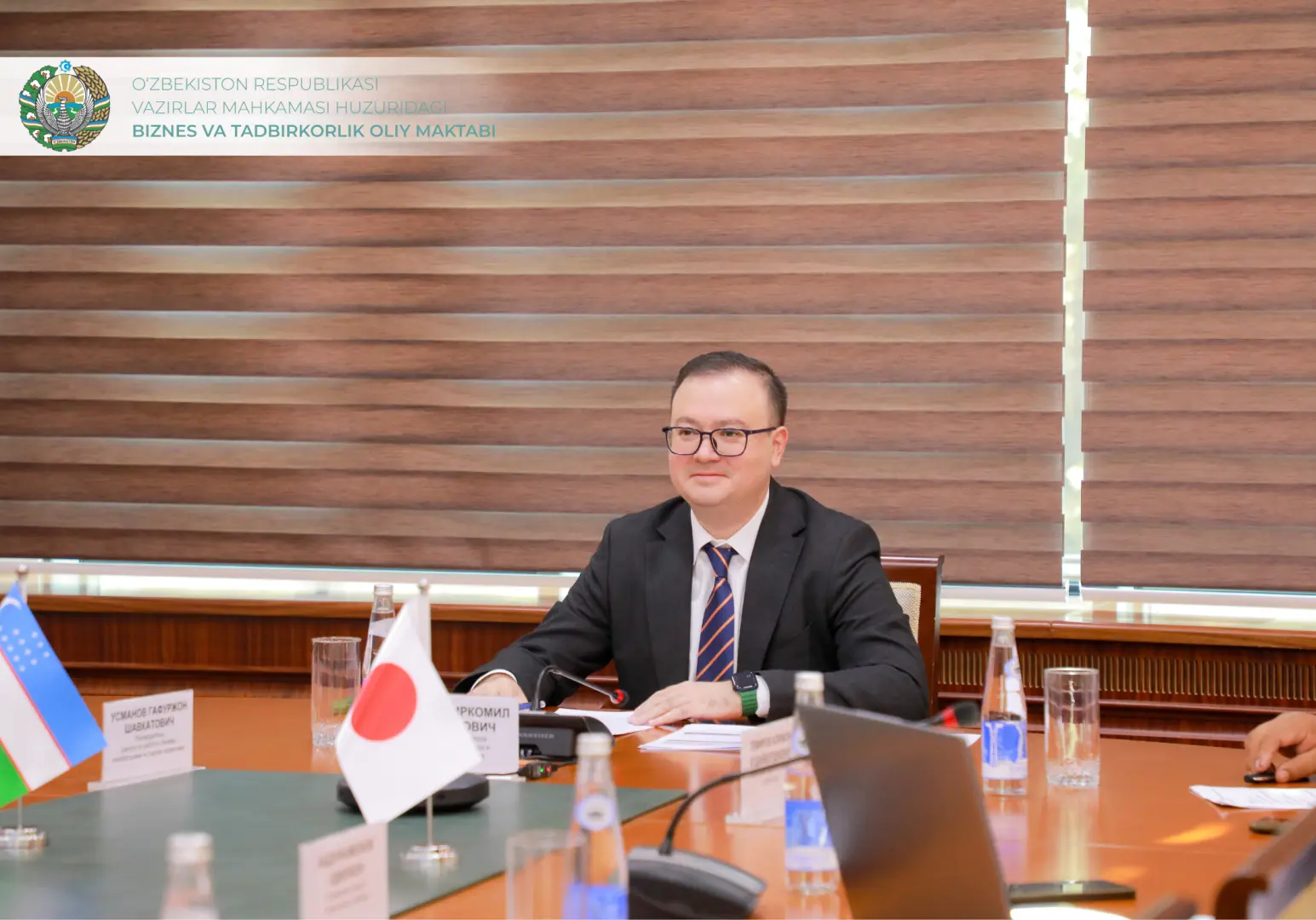News
Uzbekistan - Japan: joint step towards a "green" economy: online discussion of promising "green" projects

The "Uzbekistan - Japan Online Business Dialogue" was held in cooperation with the Graduate School of Business and Entrepreneurship and the Japan Association for Trade with Russia and NIS. Representatives of state organizations, banking and financial structures, industry, and the private sector of the two countries took part in it.
Environmental degradation caused by the misuse of natural resources directly threatens the sustainable development of the national economy, making it critical to implement urgent measures that reduce the negative environmental impact of economic activities and create the necessary conditions to foster and support a green economy.
Today, all countries in the world are taking urgent action to create the necessary conditions for developing and supporting green economies as part of sustainable national development, aiming to eliminate the harmful and destructive environmental impacts of economic activities.
Sustainable economic development now requires all countries to take urgent measures to create the necessary conditions for developing and supporting a green economy, aimed at eliminating the harmful and destructive effects of economic actors on the environment.
Many countries worldwide are actively implementing innovative solutions for green economy development: modern resource-saving approaches, digital technologies and cutting-edge developments that ensure sustainable economic growth while preserving the environment and maintaining responsible stewardship of natural resources.
In recent years, Uzbekistan has firmly committed to green economy development based on approved policy documents such as the New Uzbekistan Development Strategy for 2022-2026 and the Strategy for Transition to Green Economy and Ensuring Green Growth in Uzbekistan until 2030.
Japan also holds a prominent position among nations rapidly advancing and comprehensively developing green economy construction, creating decent living conditions for citizens based on environmental stewardship and ensuring sustainable national economic development for current and future generations. Today, the country’s green development and environmental policy have taken on new meaning and become essential components of Japan’s sustainable development strategy.
Uzbekistan and Japan’s commitment to creating an effective economy focused on supporting and stimulating green development, on September 11, the Graduate School of Business and Entrepreneurship under the Cabinet of Ministers of the Republic of Uzbekistan, in partnership with the Japan Association for Trade with Russia & NIS (ROTOBO), hosted an “Online Business Dialogue: Uzbekistan-Japan Green Economy Development” with participation from government organizations, business associations, banking and financial institutions, industrial enterprises and small and private business entities.
At the event more than 50 leading Japanese companies participated, including Sojitz Corporation, Toyota Tsusho Corporation, Nippon Steel Engineering Co., Ltd, Fuji Electric Co., Ltd, Mizuho Bank, Mitsubishi Corporation, Yokogawa Electric Corporation, ITOCHU Corporation, ATAGO Corporation, Sansei Corporation, and numerous other companies representing diverse economic sectors.
Mr. Kyoichi Suzuki, Executive Director of ROTOBO, delivered opening remarks emphasizing the importance of expanding bilateral cooperation between Japan and Uzbekistan in developing and implementing green technologies across various economic sectors. He highlighted the interest of Japanese government organizations, industrial companies, and financial institutions in establishing business partnerships with Uzbek enterprises to advance investment projects focused on green technology development and innovative solutions that preserve the environment and reduce carbon emissions.
In the opening of the business dialogue from the Uzbek side, M. Adilov, Deputy Director of the Graduate School of Business and Entrepreneurship under the Cabinet of Ministers of Uzbekistan, expressed gratitude to the leadership of the ROTOBO for organizing the event—an initiative poised to significantly advance direct ties between Japan and Uzbekistan in the realm of green development and to open new opportunities for collaboration between government bodies and the business communities of both nations in implementing joint green economy projects.
Yu. Nakayama, Deputy Director of the Department at Japan’s Ministry of Economy, Trade and Industry, presented detailed information about Japan’s energy policy roadmap toward carbon neutrality.
T. Iida, Deputy Director of Japan’s Global Environment Centre, outlined cooperation prospects with Uzbekistan for attracting Japanese investment in green technologies through joint-credit mechanism (JCM) to investment projects in Uzbekistan aimed at industrial green development.
T. Narzikulov, Director of the Green Economy Projects Center at the Ministry of Economy and Finance, presented Uzbekistan’s strategy for transitioning to a green economy and the key priorities for achieving green and inclusive growth by 2030.
R. Gulyamov presented about the initiatives of the Project Office for Green Economy Promotion and Implementation at the Graduate School of Business and Entrepreneurship. He showcased a joint project with the OSCE focused on building capacity among government agencies and companies in green technologies and sustainable management. The project includes targeted training programs, expert support, and the development of practical materials, with dedicated sessions on green financing and creating transparent reporting systems.
Representatives of the businesses from Uzbekistan also took the stage to present their active investment projects in the green economy space.
Japanese attendees were introduced to startup projects developing green technologies, including smart bus stops and benches for modern urban settings in Samarkand Region, plus road panels and flooring made from recycled solid waste in Jizzakh Region.
A. Temirov, Director of the private company “Uzbiogas” presented the results of biogas projects that process organic waste in rural communities to serve households and farmers. He showcased successful projects rolled out across Fergana, Samarkand, and Tashkent regions.
The event also featured presentations by young Uzbek scientists from Tashkent Chemical-Technological Institute and Tashkent State Technical University on producing silver nanoparticles from electronic waste recycling for industrial applications and developing road surfaces from plastic waste processing.
Participants engaged in in-depth conversations, as Japanese business executives inquired about the practical execution of these forward-thinking green development ventures in Uzbekistan. Both countries agreed to sustain their strategic collaboration in championing green projects throughout Uzbekistan with financial participation from committed Japanese companies and organizations.


